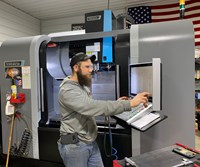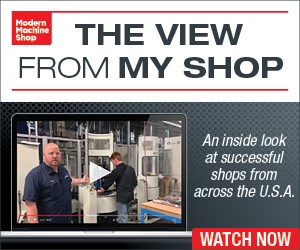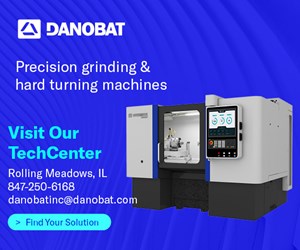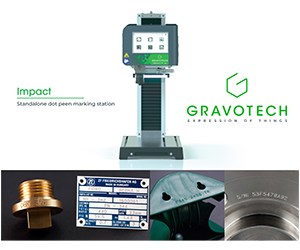How High-Tech Adhesives Benefit the Machine Shop
Strong bonds formed by advanced adhesives have enhanced machine tool construction, improved part assembly and made structural fabrications lighter and stronger. Here’s how adhesives could play a key role in your applications.
Adhesive bonds play an important role almost everywhere manufacturing occurs. As joining agents, fasteners, sealants and adhesives have proven to be stronger, lighter, tighter and more versatile than other materials or techniques. Welds, rivets and bolts have been replaced by various adhesives—and end users or consumers often notice improved performance and higher quality, even when they are not aware of the changes.
Found in the Shop
Manufacturing equipment and manufactured products have benefited greatly from these substitutions. A few examples likely to be found in a machine shop, factory or production plant show the range of technologies available.
These include flexible adhesives and sealants capable of joining and sealing dissimilar substrates of any size and finish. These bonding agents can absorb assembly stress and deformation resulting from effects like load transfer, impact, vibration or differential thermal expansion. Such constructions retain their structural integrity even with fragile elements, such as windows, contributing to overall structural strength. These solutions have proven to be resistant to most industrial fluids, including cutting oils and emulsions.
Another area in which adhesives are finding new applications is in bed and frame construction. New materials offering low expansion coefficients, such as composites or polymer concrete (mineral castings), often need adhesives for certain assembly operations.
All these Henkel solutions meet the most stringent customer requirements, including mechanical performance, durability and chemical resistance against industrial fluids.
Light materials like plastics and composites can be incorporated and joined with other materials using structural adhesives. Even cast and carbon steel can be bonded together. Flanged joints in cast components can be sealed and reinforced using anaerobic liquid gaskets, thus improving their load transmission capability. In addition, Henkel’s high-performance sealants enable manufacturers to build machines for highly clean environments, or to prevent chemical ingress and mechanical damage in machines operating in demanding working environments.
Henkel offers a comprehensive range of thread sealants and liquid gaskets to solve many common fluid sealing problems: from low-pressure fluid drainage or air recirculation systems that can be sealed with high-performance yarns, to high-pressure hydraulic, lubricant and pneumatic supply connections with screw threads that require high-performance anaerobic sealants.
One of the latest innovations in Henkel’s thread sealant family is the Loctite 55 yarn. This grade has all the advantages of PTFE tape and hemp, but none of their disadvantages. Threaded connections are easily and instantly sealed, but allow part repositioning if required. The ergonomic Loctite 55 application container enables operatives to seal around 10 times the number of threaded connections possible with one PTFE tape reel, without the usual problem of sticky, dirty grease contaminating the hemp. The product has been used in the sprinkler systems recently installed in various new airport projects, for example.
Many Choices
Loctite anaerobics are among the most recognized machinery adhesives today. This technology has dramatically evolved since the first formulations were commercialized back in the 1950s, thus keeping Henkel right at the cutting edge of the associated technologies. Henkel’s product range has progressively incorporated properties such as high temperature resistance (up to around 200 ºC in many grades), compatibility with oily surfaces and low surface sensitivity—which means most grades cure even on inactive surfaces like stainless steel or passivated metals. This improved surface tolerance makes Loctite anaerobics the first choice for both manufacturing and maintenance environments.
Threadlockers are well known in the industry, though their use is still associated with heavy-duty bolting. Threadlockers are as cheap as washers, but much more efficient when it comes to retaining a preset bolt clamping force. It is also worth noting that vibration is not the only cause of bolt loosening, with temperature change, pressure, component settlement and other phenomena also playing a part. The superiority of threadlockers has led to manufacturers increasingly using them instead of washers and other mechanical solutions.
Instant Assembly of Small Parts
Another super-adhesive technology, the Loctite cyanoacrylates or superglues, have also been used by machinery builders to bond materials like plastics, rubbers and other materials present in parts such as guards and door wipers or tags. Today, Henkel’s cyanoacrylates are unmatched in performance and manufacturing speed, with the latest developments having increased their temperature resistance by 50 percent to 120 ºC, and their fixture speed to just a few seconds under most working conditions. No rival products can equal this performance. Temperature resistance is not only noticeable around the upper limit of 120 ºC: These adhesives feature higher strength than competitor products even at temperatures around 50 ºC to 60 ºC, where most grades show a dramatic decline in strength.
Noise and Vibration Management
Some heavy machines, such as metal-forming equipment, create heavy-duty dynamic forces, high vibration and noise. The use of flexible adhesives instead of sound insulating mats can reduce noise and vibration transfer. However, only the most advanced coatings designed to attenuate structure-borne sound can efficiently absorb the strong vibrations that occur. Such materials can be sprayed onto the metal surfaces at room temperature, reducing manual operations and manufacturing costs.
Application Guidelines
Henkel fulfills the most stringent manufacturer requirements. Its solutions are compatible with a wide variety of machinery fluids and working environments, and comply with different standards recognized across the industry.
Henkel develops specific solutions for all industrial needs. Its structural bonding technologies help to both reduce weight and increase construction stiffness, and therefore enhance equipment accuracy. This is only feasible with assembly methods that evenly distribute stresses when joining dissimilar metals, or indeed composites and plastics. Material selection is not therefore restricted to a limited number of materials, and customers can base material selection on purely functional criteria, enabling them to choose the most appropriate substrates. The use of adhesives enables manufacturers to incorporate new materials, combining their features in the most convenient way. For example, fast-cure flexible sealants exceed the usual customer requirements through their ability to bond materials such as painted and bare steel, stainless steel, castings and glass. This also makes new designs possible, enabling producers to create or repair new generations of readily marketable machines.
Advances Continue
Henkel continues to push innovation by developing state-of-the-art technologies to solve the latest machinery challenges. Sustainable anaerobics are one of the latest lines. These products contribute to a more sustainable manufacturing environment while not compromising the highest performance standards.
Gap filling cyanoacrylates are another recent innovation, based on two component easy-to-dispense systems that are able to bond and fill non-coincident substrates at the same speed as a standard instant glue.
Hybrids are the latest innovation expected to revolutionize the adhesives world. This technology is closing the gap between instant adhesives and structural adhesives, creating highly durable grades with a universal bonding capability and enhanced thermal resistance.
The “Missing” Revolution – New Design Opportunities
The above applications are a few examples of the grades used in today’s machine shops. However, the machinery industry is one of the few sectors that has not yet fully exploited the potential of adhesives. It’s expected that the increasingly competitive environment will make machinery builders look for new assembly methods that significantly reduce manufacturing costs and raw material consumption, as has been the case in other sectors over the past few decades. Here, adhesives will play a key role as enablers of new machinery designs.
Machinery guards, for example, can be manufactured in a much lighter fashion by bonding stiffeners to panel structures, as shown in the elevator industry. The automotive industry has demonstrated that bonding safety and inspection windows reinforces panels and reduces frame weight. In addition, other materials like composites and plastics may help machinery builders innovate and create new appealing, lighter designs with rounded shapes, as in the ship industry. Machinery structures may also be subject to weight reduction and the use of new materials like light metal alloys and composites. Manufacturers in the aerospace industry have progressively incorporated these materials into existing structures by using adhesives.
Henkel operates worldwide with leading brands and technologies in three business areas: Laundry & Home Care, Beauty Care and Adhesive Technologies. Founded in 1876, Henkel holds globally leading market positions both in the consumer and industrial businesses with well-known brands such as Persil, Schwarzkopf and Loctite. Henkel employs about 47,000 people and reported sales of 16,510 million euros and adjusted operating profit of 2,335 million euros in fiscal 2012. Henkel’s preferred shares are listed in the German stock index DAX.
Read Next
The Cut Scene: The Finer Details of Large-Format Machining
Small details and features can have an outsized impact on large parts, such as Barbco’s collapsible utility drill head.
Read More3 Mistakes That Cause CNC Programs to Fail
Despite enhancements to manufacturing technology, there are still issues today that can cause programs to fail. These failures can cause lost time, scrapped parts, damaged machines and even injured operators.
Read More










.png;maxWidth=300;quality=90)












